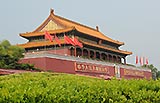China cuts fuel prices for 2nd time in a month
(Xinhua) Updated: 2012-06-08 20:27BEIJING - China will lower the per-tonne retail prices of gasoline and diesel by 530 yuan ($84) and 510 yuan, respectively, starting from Saturday, the National Development and Reform Commission (NDRC) announced Friday.
The move, which marks the second cut in a month, was made in response to lower crude prices on the global market, an unnamed official with the NDRC said.
The adjustments will lower the benchmark retail price of gasoline by 0.39 yuan per liter and diesel by 0.44 yuan per liter.
"The cut is smaller than expected, probably because authorities want to protect domestic refiners from serious losses," said Liao Kaishun, an analyst with C1 Energy.
NDRC last changed gasoline and diesel prices on May 10, cutting them by 330 yuan and 310 yuan, respectively.
Under China's oil product pricing system introduced in 2009, domestic fuel prices may be adjusted when international crude oil prices change by more than 4 percent over a period of 22 working days.
Friday's announcement came after the country's central bank cut benchmark interest rates for the first time in more than three years.
"If global oil prices continue to fall, authorities may lower fuel prices again in July," said Liao.
Light sweet crude for delivery in July was down $2.41 to $82.41 a barrel in the late afternoon, while Brent North Sea crude for July delivery shed $2.22 to $97.71.
"The latest cuts will help ease inflation and boost relevant industries," said Lin Boqiang, an energy expert at Xiamen University.
China's inflation rate slowed to 3.4 percent in April from 3.6 percent in March and was widely expected to ease further in May due to falling food prices and the base effect.
The country's consumer price index, a main gauge of inflation, may drop below 2 percent if fuel prices continue to fall, said Xiang Yue, an analyst with Great Wall Securities.
Shares of China Eastern Airlines Corporation Limited rose 2.68 percent to 4.21 yuan per share, while Hainan Airlines Company Ltd. gained 3.58 percent to reach 5.21 yuan at Friday's close.
However, stocks of the country's two oil giants dropped hours before the announcement. PetroChina fell 0.2 percent to close at 9.11 yuan per share and Sinopec declined 0.5 percent to 6.45 yuan.
The country's top economic planner has ordered major oil companies to ensure market supplies during the summer peak, the NDRC official said, adding that price regulators at multiple levels will keep a close eye on local retail prices.
Analysts say this year's global oil market will depend on global economic trends, geopolitical conditions in major oil-producing countries and this year's US election.
European debt woes are worsening and investors have been disappointed at US Fed chief Ben Bernanke's failure to commit to any new stimulus measures.
Bernanke told the U.S. Congress on Thursday that he was "prepared to take action" to provide support, but gave no hints regarding possible stimulus measures.
In Europe, Spain is expected to request European aid for its ailing banks over the weekend to forestall worsening market turmoil, becoming the fourth and biggest country to seek assistance since the eurozone debt crisis began.
"Since high oil prices will irritate voters, there is little chance that the US will push up prices before the election," said Kong Qingying, a manager with China International Capital Corporation Limited.
On the other hand, major oil producers like Iran will not reduce production if they are not harassed, said Yin Gang, a Middle East expert at the Chinese Academy of Social Sciences.
On January 23, the Eropean Union agreed to an oil embargo on Iran effective from July and a freeze on the assets of Iran's central bank, a decision that threatens Iran's economy, as oil exports provide about 80 percent of Tehran's revenues.
"This will increase uncertainties in global crude oil markets," said Wang Jintao, an analyst with Chem365.
President Hu Jintao met with his Iranian counterpart Mahmoud Ahmadinejad in Beijing on Friday and told him that it has been China's persistent policy to solve the Iranian nuclear issue through dialogue and cooperation.
Hu said both countries should promote people-to-people exchanges and maintain coordination on major international and regional issues so as to preserve regional peace and stability.
- Tian'anmen gets early makeover for grand parade in September
- Oil giants sued over Bohai spill
- Lax checks led to 'chaotic incidents'
- Recycling project targets industrial waste around Beijing
- Xi congratulates Maldivian president on Independence Day
- One of 100 most-wanted fugitives caught in Macao
- China begins putting together radio telescope
- Millions use homemade map of bullet train lines
- Top Hebei official is suspected of graft
- Official pronouncements supporting young Chinese







